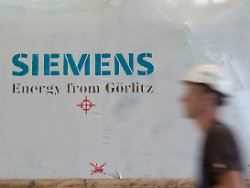Siemens AG plans to list its low-margin energy business on the stock exchange at the end of September. An extraordinary general meeting is to pave the way for a spin-off of the group. The goal: to make the division more profitable.
Siemens is taking the last steps on the way to separating from its energy business. In the morning, the extraordinary general meeting is to approve the spin-off and the IPO of Siemens Energy at the end of September. Even if there is partial criticism from shareholders about the move, a majority is considered safe for the spin-off.
For the fact that Siemens secures the energy business with around 91,000 employees and an annual turnover of 29 billion euros, the group gives one reason above all: alone the energy business can develop better and get better money for investments. In the large group of companies, this is more difficult for the comparatively low-margin energy business. The remaining Siemens group in turn wants to concentrate on its more profitable business areas such as Smart Infrastructure and Digital Industries.
The departing subsidiary Energy is firing Siemens with solid financial resources. In May the equity ratio was given as 37.8 percent. The rating agency S&P recently awarded a solid rating of BBB. However, this is a good deal weaker than the A + of the parent company. Overall, however, it can also be heard from the employee side that the spin-off is fair. One of the opponents of the spin-off is the association of employee shareholders in Siemens AG, which will also reject them at the general meeting. We for Siemens, another association of employee shareholders, have also expressed skepticism, but will agree.
"Absolutely increase profitability"
The spin-off has support for institutional investors. "The spin-off enables Siemens AG to have a leaner structure and focus on future business. That is exactly what the capital market has been demanding for a long time," says Vera Diehl from Union Investment. Deka Investment will also vote for the spin-off. Criticism can also be heard from there: Energy must "absolutely increase profitability," says Winfried Mathes. And the current development at Siemens shows "that the shot of focusing too strongly on a few business areas can backfire in times of crisis."
In addition to the old Siemens Power and Gas division, Siemens Energy also includes the 67 percent stake in the Spanish wind power company Siemens Gamesa. The company is currently based in Munich and it will be decided in the course of the second half of the year whether this will remain the case. However, the seat should remain in Germany. Given its size, Siemens Energy is also considered a relatively safe candidate for inclusion in the MDAX; the company could possibly even move up to the DAX in the medium term. However, it depends on trading volume and market capitalization. How high these will be will only become clear when the new shares are on the stock exchange.
They are to be distributed to Siemens shareholders on September 25 and traded from the 28th. Siemens and its pension fund will initially hold 45 percent in Energy, but this proportion is expected to decrease significantly within twelve to 18 months. Outgoing Siemens CEO Joe Kaeser is to become the first chairman of the supervisory board.
.
